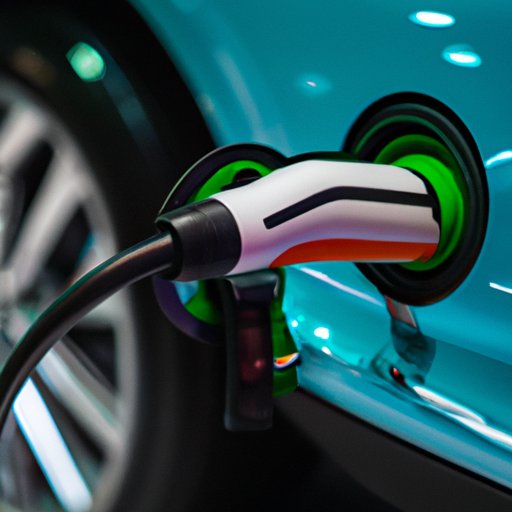Introduction
As electric vehicles (EVs) become increasingly popular in the automotive industry, one of the most common questions that arises is “how long does it take to charge an electric car?” This question is important for potential EV owners to consider when deciding if an electric car is right for them. It is also essential for current EV owners to understand how long their car takes to charge so that they can plan their trips accordingly. In this article, we will explore the different factors that influence electric vehicle charging times and provide a comprehensive guide on how long it takes to charge an electric car.

A Comprehensive Guide to Charging Times for Electric Cars
When it comes to charging an electric car, there are two main types of chargers: level 1 and level 2. Level 1 chargers use a standard three-pronged plug and draw electricity from a 120 volt outlet. These chargers are typically used for overnight charging and offer a charging speed of up to four miles per hour. Level 2 chargers require a 240 volt outlet and offer a much faster charging speed of up to 25 miles per hour. These chargers are typically used for public charging stations.
How Much Time Does It Take To Charge An Electric Vehicle?
The amount of time it takes to charge an electric vehicle depends on several factors, including the battery size, charger type, ambient temperature, and power source. For example, a larger battery size requires more energy and therefore takes longer to charge than a smaller battery. Similarly, fast charging with a level 2 charger takes less time than slow charging with a level 1 charger. Ambient temperature can also affect charging times, as colder temperatures reduce the efficiency of the battery. Finally, the power source can also have an effect, as some power sources provide more energy than others.

Exploring the Different Charging Speeds of Electric Vehicles
When it comes to charging speed, electric vehicles can be divided into two categories: fast charging and slow charging. Fast charging involves using a level 2 charger and can take anywhere from 30 minutes to 8 hours depending on the battery size. Slow charging, on the other hand, involves using a level 1 charger and can take anywhere from 8 to 24 hours to fully charge a battery.
The Pros and Cons of Fast Charging Your Electric Car
Fast charging has both advantages and disadvantages. On the plus side, fast charging allows drivers to quickly replenish their battery and get back on the road. It also helps drivers avoid waiting around for hours while their car charges. On the downside, fast charging can reduce battery life over time and can be more expensive than slow charging. Additionally, some public charging stations may not be equipped with level 2 chargers, making fast charging impossible.

Charging Your Electric Car: Understanding Charging Time Factors
In order to determine the amount of time it takes to charge an electric vehicle, it is important to understand the different factors that can affect charging times. The first factor is battery size, which determines how much energy the battery needs to reach a full charge. Second, the type of charger being used affects charging times, as level 1 chargers offer slower charging speeds than level 2 chargers. Third, ambient temperature can reduce the efficiency of the battery and therefore increase charging times. Finally, the power source can also affect charging times, as some power sources provide more energy than others.
Conclusion
To sum up, the amount of time it takes to charge an electric vehicle depends on several factors, including battery size, charger type, ambient temperature, and power source. Fast charging can help drivers quickly replenish their battery, but it can also reduce battery life over time. Slow charging, on the other hand, can take more time but is more cost-effective in the long run. Ultimately, understanding these factors can help drivers make informed decisions about charging their electric cars.


